(4 pm. – promoted by ek hornbeck)
…and check the dip-stick on my salvation!
Ilargi: I’m convinced it’s not so much that it’s hard to understand; instead, it’s hard to accept. Still, for most people that’s enough reason to not understand.
It might therefore be a good moment to reiterate what we’ve said often before at The Automatic Earth: the financial system as we know it can not be saved. It doesn’t matter whether “official institutions” nominate 30 banks as being too big to fail, or 300. It is inevitable that the enormous amounts of debt accumulated in a relatively and amazingly short period of time must be serviced. Pay offs, write downs, defaults, bankruptcies. They’re cast in stone. It’s too late, too big to fail or not.
Here’s another gob-smacker that’s easier to understand than God is dead, but is even harder to accept: Not only is the economy about to get its zombie head blown off, it won’t be reincarnated as anything we’d recognize as normal for the foreseeable future, because the peak oil debate is over.
Again, it’s easy to understand that global oil production has clearly plateaued over the past seven years (for the first time since WWII), and that year-on-year declines are imminent. After we drink the second half of our milkshake, there’s no more milkshake.
Read the ASPO-USA press release, in particular the letter to Dr. Steven Chu, here. Check with Dr. James Schlesinger (former Sec Def, CIA director, Sec Energy, Atomic energy Chair, etc.,), or Dr. Robert Hirsch (former Sec Energy, author of the 2005 Hirsch Report), or drop in at Dave Cohen’s joint.
If you still find acceptance difficult, you may prefer to join Daniel Yergin and Barack Obama in their Pulitzer- and Peace Prize-clutching quest for oil, money and power. You can buy yourself some limited edition Justice Coins to fondle during our next regime change humanitarian operation in the oily regions of the world.
Homo sapiens, we hardly knew Ye.
The part that’s hard for me to accept, the part that should make any thinking person’s blood run cold, can be summarized in the following graphs, showing energy use (top) and human population growth (bottom) over the millenia. I set the lower bound of the x-axes at -10,000 years (10,000 BC), just to show how long the human population skipped along the bottom even after the advent of agriculture, and to give some context for the anomalies in both energy use and population that occurred in the past 150 or so years.
Of course, the oldest known modern human skull now dates back to around 200,000 years ago, which is to say that although we remained the exact same species of “Knowing Man” (according to Linnaeus’s binomial nomenclature, which unceremoniously demoted us from god’s likeness to the order of primates, albeit large-brained primates) our modern intellect, such as it is and has been for hundreds of thousands of years, long preceded our abject domination of the planet through sheer brain power in the more recent and to-be-short-lived Anthropocene. While expert knowledge importantly accumulated over millenia, it was not unleashed in a tsunami-like fashion of feeding and fornicating until the brief age of essentially free fossil fuel energy.
Another way to look the graphs above is to combine them into one correlation of near mathematical perfection, i.e., world population as a function of energy use:
Lord knows I’ve made some pretty graphs in my days, but how often does an r-squared approaching 1.0 fall out one’s spreadsheet without any grooming whatsoever? I suppose some refusenik butthole will show up to stand athwart the axes to proclaim that correlation does not imply causation! That it was the growing population that caused increased energy use, that more people means more brains and innovation in the free market of ideas, and at this rate of intellectual explosion we’ll all own our own planets in, oh, two, three year from now.
But again, call me doubtful that we brainiacs can re-pave southern California from Long Beach to the San Gabriel mountains in the absence of fossil fuels. We spent hundreds of millennia going from shivering in caves and cracking nuts with stone hammers on root anvils to agriculture, and working our way from stone and bone to metal, and eventually graduating with “dipolmas” made from paper rather than clay tablets. We even made large advances in the scientific method prior to free energy, and despite Shakespeare and Newton, we didn’t proliferate like bunnies. The preponderance of our exuberance appears due to free energy, not braininess. So, what’s hard to accept is that when the straw starts making sucky noises at the bottom of the milkshake, I’m gonna miss a lot of you surplus eaters.
GDP Depends on Energy
Circling back to Ilargi’s most probably true assertion that “the financial system as we know it cannot be saved”, I’m obliged to point out that their view of economic collapse does not depend on peak oil, that the debt-bubble Ponzi fraud was destined to collapse no matter what, based on psychological factors alone, based on the sheer hijacking of Wall Street’s mania by limitless greed, and the subsequent fear of being unable to cash-in on infinite claims on wealth that brings walls crumbling down; and that no matter how much money Wall Street and central banks siphon off future generations, labor and pensions, and infrastructure, etc., the system had become a massive black hole from which money cannot return.
I find it plausible that the financial parasites would take down Western civilization from Homer to Colbert in order to line their pockets for a mere nanosecond more of Financial Extenz; however, infinitely compounding the misery of mesolimbic dopamine systems run amok are the hard physical facts of natural limits.
The “beauty” of peak oil is that after a century of goony-to-mendacious economic quackery, Mother Nature is going to fact-check the economists’ version of Cartesian mind/body dualism, wherein abstracted economic “laws” are disembodied from the physical world and its laws. Big Mama Lulu Belle intends to vet the general religious conviction in permanent exponential growth on a finite planet; whether belief in fiat money alchemically alters physical constants, rates and angles of photons hitting the planet, rate-limiting enzymatic action, binding and dissociation constants, phase states of matter, conversions of matter and energy, or rates of growth and reproduction; and specifically whether throwing money at the ground produce trees, topsoil, potable water, and oil; whether throwing money at the sky produces rain, whether throwing money in the sea replenishes fish stocks, de-acidifies the oceans, or makes Sperm whales spout endless fountains of ‘parmacetti for our oil lamps.
Let’s take a wild stab at prognostication.
cleveland et al compared generic energy (in BTUs) use to GNP in the United States during a hundred-year period of intensive fossil fuel use.
shazaam! The dependency of economic growth on energy use looks an awful lot like the dependency of population growth on energy use.
The same was true when I compared energy and GDP in a between-nations comparison:
I looked at 180 nations, between-nations, within-nations, it’s the same story all over, except for a tiniest handful of war-torn or tiny Carribean tax-haven exceptions, e.g., Afghanistan.
Fill ‘er up with the Holy Ghost!
A 1970s gas station turned into a revival hall:
I remember the Seventies fondly. After passing national peak oil 1971 (as ho-hum predicted), suffering the Saudi Oil Sword in 1973, and losing our Iranian puppet in 1979, the elites and commoners alike had hard choices to make in this country. We could have chosen the initially more difficult, yet “stich-in-time” path of conservation and developing alternative energies outlined in Jimmy Carter’s “malaise” speech, but instead we chose debt-based military and economic, “America, Fuck Yeah!” imperial expansion under the guidance of a rigidly ideological proto-fascist B movie actor slipping into Alzheimer’s dementia.
All the Cassandras from Paul Erlich to William Catton were, well, slandered and dismissed. Even to this day, people routinely exhume Malthus in order to spit on his rattling bones, even though it was his population analysis that carried Darwin to the threshold of Natural Selection, arguably the greatest idea in the history of man. Pardon us if his conclusions were only temporarily delayed by the age of oil.
Wiki on William Catton:
The core message in Overshoot is that, “… our lifestyles, mores, institutions, patterns of interaction, values, and expectations are shaped by a cultural heritage that was formed in a time when carrying capacity exceeded the human load. A cultural heritage can outlast the conditions that produced it. That carrying capacity surplus is gone now, eroded both by population increase and immense technological enlargement of per capita resource appetites and environmental impacts. Human life is now being lived in an era of deepening carrying capacity deficit. All of the familiar aspects of human societal life are under compelling pressure to change in this new era when the load increasingly exceeds the carrying capacities of many local regions-and of a finite planet. Social disorganization, friction, demoralization, and conflict will escalate.”[4] Catton here also coined the term Cosmeticism for “faith that relatively superficial adjustments in our activities will keep the New World new and will perpetuate the Age of Exuberance.”
It’s not hard to understand. It’s just hard to accept. And who are you going to believe? William Catton? Or a man who aids and comforts “The Human Boiler” Islam Karimov in order to gain military supply lines into Afghanistan? Fortunately, we don’t have to wait twenty years to find out the results of the Death Match between “economic faith in the status quo” and “physical limits.” Robert Hirsch predicts imminent year-on-year declines beginning between 2012 and 2015. It’s popcorn time. Also, check out Hubbert’s Third Prophecy.
Goodbye, Versailles: Re-seeding society from the bottom-up
After assailing you with grim pre-occupations, I’d like to leave it dangling on a “Rose O’ Sharn nursing-a-hobo” positive hook, a word from Brian Eno on “composers as gardeners,” ideas which seem applicable well beyond realms of musical composition. I particularly liked his comments on the long-forgotten “skill of surrender.”

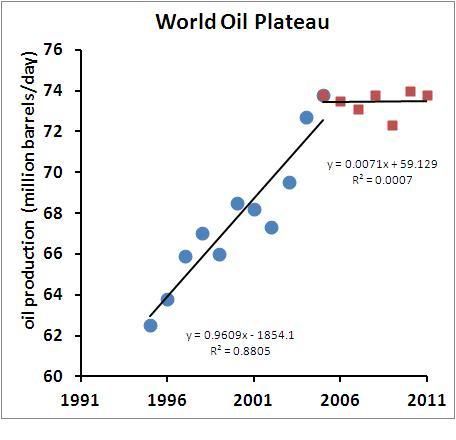
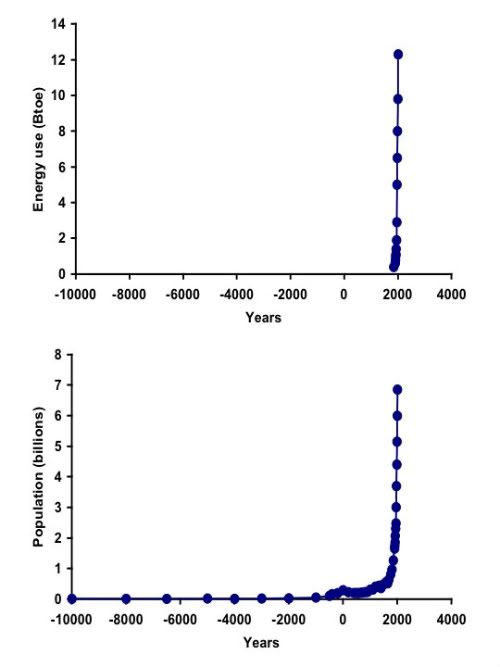
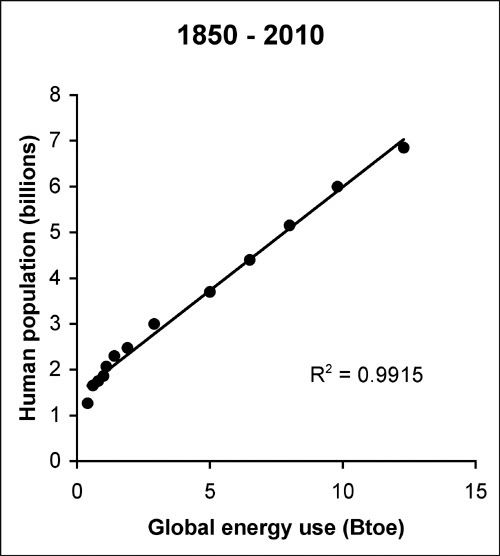
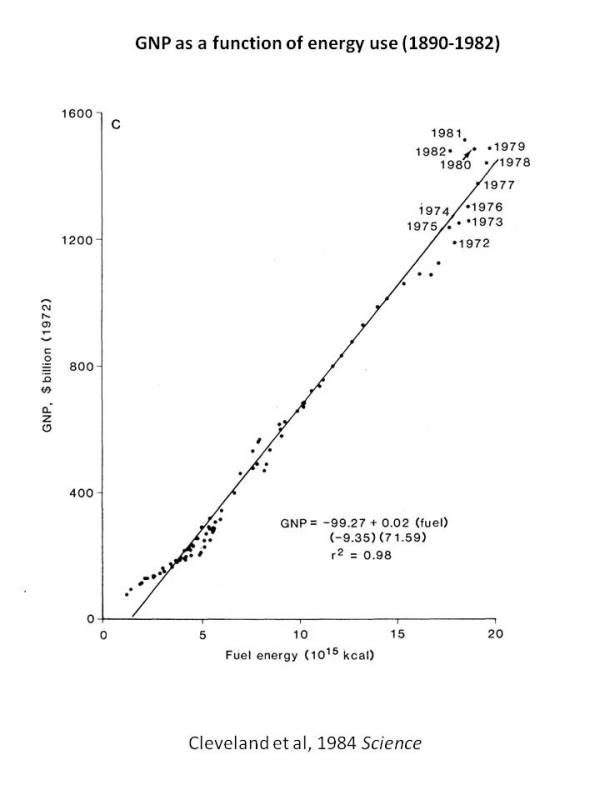
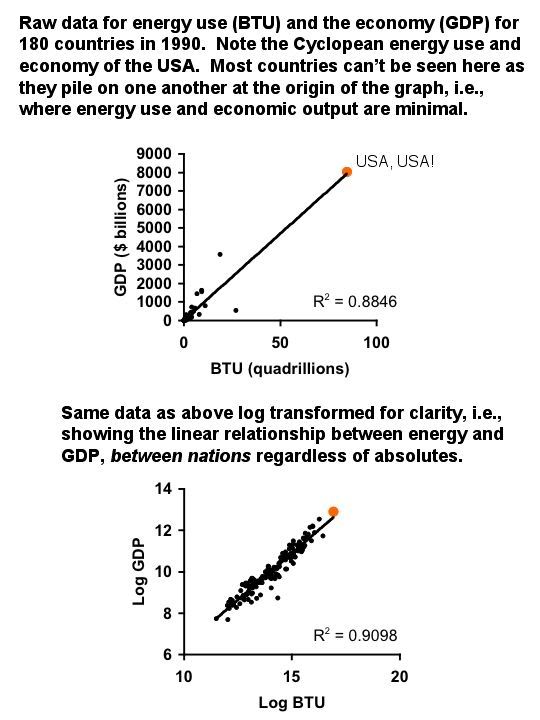

2 comments
no matter how good the sex is.
Is this “our” fifth or sixth extinction level event. Have “we” already acheived high technological levels of “civilized” society. If I, you, anybody could have the 1.2 gigawatts of flying time machine Delorians would we not be just more dangerous as a species.